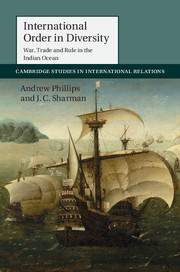Book contents
- Frontmatter
- Contents
- List of maps
- List of tables
- Acknowledgements
- Introduction
- 1 The puzzle of durable diversity in International Relations
- 2 The initial growth of diversity, 1500–1600
- 3 The expansion of diversity and competition under heteronomy, 1600–1650
- 4 The stabilization of diversity, 1600–1750
- 5 Reconfiguring diversity in the age of empire, 1750–1900
- Conclusion: Order in diversity
- Bibliography
- Index
- CAMBRIDGE STUDIES IN INTERNATIONAL RELATIONS
3 - The expansion of diversity and competition under heteronomy, 1600–1650
Published online by Cambridge University Press: 05 May 2015
- Frontmatter
- Contents
- List of maps
- List of tables
- Acknowledgements
- Introduction
- 1 The puzzle of durable diversity in International Relations
- 2 The initial growth of diversity, 1500–1600
- 3 The expansion of diversity and competition under heteronomy, 1600–1650
- 4 The stabilization of diversity, 1600–1750
- 5 Reconfiguring diversity in the age of empire, 1750–1900
- Conclusion: Order in diversity
- Bibliography
- Index
- CAMBRIDGE STUDIES IN INTERNATIONAL RELATIONS
Summary
The preceding chapter introduced two of the early modern Indian Ocean's key players: the Portuguese Estado da Índia, spread across the maritime littoral of the whole region, and the fantastically rich and powerful Mughal Empire, concentrated in the north and centre of the Indian subcontinent. This chapter is devoted to a different kind of actor, the company sovereign, represented by the English East India Company (EIC) and the Dutch East India Company (Vereenigde Oost-Indische Compagnie, abbreviated to VOC, literally United East India Company). These companies were profit-making private concerns that pioneered the modern corporate form, but also enjoyed prerogatives now conventionally regarded as the exclusive preserve of sovereign states, like making war and peace and conducting international diplomacy. As private–public hybrids without modern equivalents, different in their corporate form from both the statist Portuguese and imperial Mughal domains, these actors further accentuated the diversity of the Indian Ocean international system when they burst upon the scene from 1600.
The two companies transformed international politics and trade in the Indian Ocean. Built as the world's first joint stock and multinational company, the VOC ‘smashed to pieces’ the existing trade system, savaged the Portuguese domains, and sometimes employed near-genocidal levels of violence in consolidating its hold over the spice trade. By the time the company eventually went bust in 1800 it dominated swathes of the archipelago that later became present-day Indonesia. In a recent on-line controversy about the most valuable company ever, the peak value of the VOC, put at 78 million Dutch guilders in 1637, is said to be equivalent to $7.4 trillion in inflation-adjusted 2012 dollars, larger by far than the value of any other publicly traded company.
If anything the impact of the English East India Company was even greater. Though at first lagging behind their Dutch counterparts, the EIC ultimately displaced the mighty Mughal Empire (albeit after the Mughals had declined for unrelated domestic reasons) as South Asia's pre-eminent power.
- Type
- Chapter
- Information
- International Order in DiversityWar, Trade and Rule in the Indian Ocean, pp. 102 - 136Publisher: Cambridge University PressPrint publication year: 2015

